#immutable mutuals
Explore tagged Tumblr posts
Note
mahogany ruby pink!’
Mahogany - let's go on a late night drive together and listen to one of your playlists.
Ruby - you are such a gem, you deserve so much better <3
Pink - biting you biting you biting you biting you licking you biting you biting you
You are the sweetest!! I would love that so much! Driving along the dark mountain roads, bumping a playlist while on the way to stargaze. Though my music taste is a lot of Owl City, Aurora, the Cranberries, Imogen Heap, and Hatsune Miku 😅
I want a Wolf shaped bruise from your precious mouth, please and thank you!!
2 notes
·
View notes
Note
I'm a fidough, and you're an eevvee
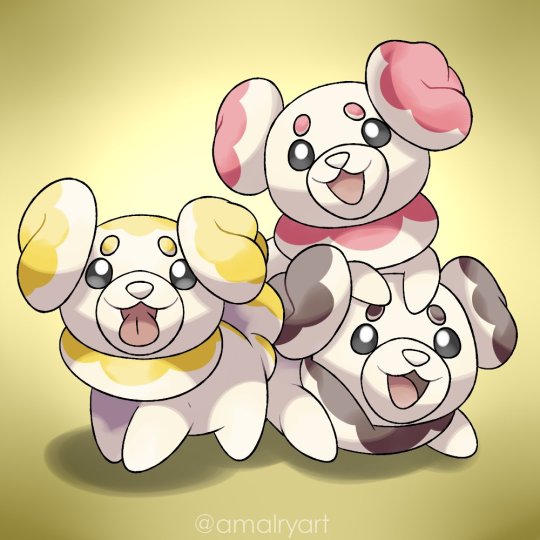

Woof woof! It's puppy hours!! I'm playing pokemon and if you got turned into a pokemon, what do you think you'd be? (Even if you don't know Pokemon names, you could look up cute pokemon until one seems right and I could tell you about them if you want :3)
I have a few I thought of for you too but I wanted to know what you would say first ehehe
-🍑
aaaaaaaa i love pokemon! i had to look through the list bc i am indecisive,,,,,
i would be something cute and fluffy for sure, there are too many choices tho!!
i'm thinking,,,, perhaps clefairy? OR rockruff bc that's a cute doggy :3
what would you be??? what would you think i would be???
4 notes
·
View notes
Note
skye u were in my dream last night as my paper mario mutual : )
im crashing peoples dreams now this is just like mario and luigi dream team for the nintendo 3ds
#skye's ramblings#FGHJHGF thats really funny i had the same role as in real life. paper mario mutual is an immutable part of my identity <-true#bowIetta#shrimps squad
7 notes
·
View notes
Text
Tagged by @silverofthunder 💕 thank you Jen!
Passing this on to @be-gay-comm1t-arson, @rightintheghoulies, @vpyre, @whipperschnapper & @sakuraspoke - no pressure as always!
(& a free tag to any of my mutuals that want to do this - consider this your invite 😎)
#p.s. Jen i'm sorry but impera is 1000000% your vibe. IMPERA SWEEP#tag game#mutuals#I AM SO UPSET THAT FEVER DREAM IS NEARLY TEN YEARS OLD#the immutable passage of time.....................
4 notes
·
View notes
Text
Made some lit af bracelets🔥🔥
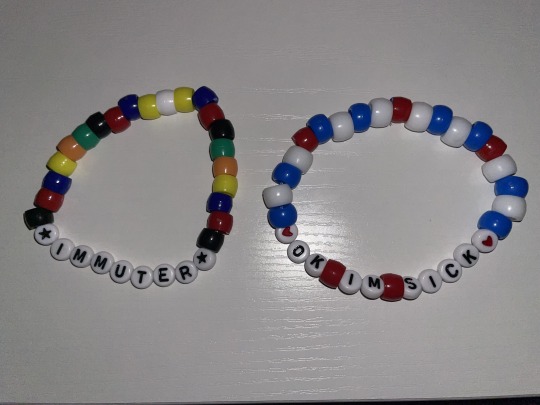
#Immuter is a local band and Ok I’m Sick is an album by Badflower#Both r fire yall should listen 2 them🔥#I wanna start making bracelets more so I can trade with people#@ mutuals if I ever meet yall im gonna give yall bracelets#Victor Speaks
5 notes
·
View notes
Text
Thinking more abt DR1. The tragedy of the DR1 characters has a unique strength to me, precisely because we know that absent of Junko's Mutual Killing, they all eventually end up getting along pretty decently! Probably one of the most relevant examples for my muse is Makoto's relationship with Maizono-- in settings without the Mutual Killing such as Development Mode and Talent Development Plan, their interactions are nothing but friendly, supportive, and even sometimes a little intimate. It's not difficult to infer that during the single regular year at Hope's Peak, they got along just as well or were moving towards that. And all of that just makes what happens during the main game to the whole cast, not just Makoto and Maizono, even more of a bitter pill to swallow since along with their memories Junko stole even intangible things like relationships. Another example of this is Oowada and Fujisaki: that picture Monokuma (Junko) "dropped" really says it all...
#ooc ramblings.#currently listening to Rats Died like a true dr fan and that inspired me to think abt this (as well as reading DM and TDP scripts)#i think something i might start to lean into more with post-dr1 Makoto is that he is different from the Makoto that stepped into those door#the current Makoto woke up trapped and closed in and blocked at all sides and his immutable tenacity is what helped see him through#and even though he eventually got his memories back thanks to the Future Foundation I can't imagine that those memories are just#normal memories for him. the mutual killing TRULY traumatized him and from his (DR1/post-DR1 Makoto) perspective it was an#immediate progression from stepping into the school to waking up sitting in that godforsaken desk DR3 traps him back in in kibou-hen#i dunno if I'm explaining it well but play the video game SOMA to understand what I'm getting at. it's not the same as in that game#but the principle I'm thinking of is kind of similar...
2 notes
·
View notes
Text
“transphobia hurts us all” is an analytical statement. It is making a claim about how a specific bigotry operates in the world, and its supposed analytical value is in revealing something about transphobia that appears on the surface to be counter-intuitive - “while you might think transphobia only hurts transgender people, that isn’t the case; it hurts cisgender people too.” The follow-up to this statement, sometimes implied and sometimes explicit, is a moral imperative - transphobia is a social ill that hurts us all, so we should seek to get rid of it.
This analytical-moral chain of logic isn’t unique to this statement; a lot of analyses of the social world come from a broader desire to “figure out what to do.” When we investigate a social phenomenon to uncover its inner workings, and in this investigation we identify the scope and impact of the harm it causes, we are in a better place to understand how to reduce harm in the world. Of particular interest in this investigation of transphobia is highlighting its illegitimacy - if transphobia also harms cisgender people, this is evidence of its illegitimacy as a social force in the world. We have uncovered some fundamental contradiction in the workings of bigotry, and this contradiction provides a rational ground for us to oppose it. Of course transphobia is irrational and must be opposed; it harms other groups of people who are not transgender.
This is also why people object to this statement on analytic grounds - disagreeing with the argument that transphobia hurts everyone is a critique of analysis. Importantly, it is not a dismissal of empirical evidence; we can see many direct real-world examples of cisgender people being targeted for transphobic abuse, such as cis people being attacked in bathrooms for “looking transgender.” A critique of the claim that transphobia hurts us all is a methodological critique, it is a critique of analytical framing; we are operating from the same set of social facts, but reaching different conclusions. The reason for this is because we are using different investigative and theoretical tools in our analysis. And these differences are not trivial; how we define the social phenomena under investigation directly informs how we understand the facts in front of us.
So first, we must settle the problem of definitions - what is transphobia? Simply defining it as a hatred of transgender people is insufficient for all parties. If it does indeed also hurt cis people, then this definition doesn’t do us much analytical good. Where do we go from here? Perhaps a better place to start is to investigate its origins - what assumptions does transphobia operate from? Where do those assumptions come from? This is where we start getting somewhere. Transphobia draws its core assumptions from cissexualism - the belief that there are two mutually-exclusive and irreconcilable sexes, sexes which are immutable and biologically hard-wired, meaning that it is a difference in human beings that exists independent of the social worlds that human beings build. This idea is bound up in many forms of power, one of which being patriarchy; yes indeed there are two sexes, and one of them is better than the other. And because sex is hard-wired, then patriarchy is likewise a simple fact of nature. These assumptions are also bound up in reproduction; one sex impregnates (this is the powerful sex) and one sex gets impregnated (this is the weak sex). These ideas and assumptions structure much of our social world, being embedded in many social, political, and economic institutions, from family to labour to dating to census records to political office, and so on.
Transphobia is thus an output of these logics - if sex is biological, and sex determines your place in society, then attempting to change your sex means you are thwarting the natural hierarchy of human beings. You are either trying to rise above your station, or abandoning your post. Either option is grounds for punishment. Why would you go against nature? How dare you?
So, transphobia is a bigotry that comes from cissexualism. We could investigate further where cissexualism comes from (and indeed those investigations are taking place), but for our purposes we now have a much more analytically rich definition. Transphobia is a social technology of discipline; it performs a regulatory function for the continuation of cissexualism, much the same way that misogyny is a regulatory apparatus of patriarchy, and homophobia is a regulatory apparatus of heterosexuality. These bigotries perform a very ‘rational’ social function; they reproduce existing forms of power by policing their borders and brutalising anyone who does not behave in accordance with their logics.
We now return to the original question: does transphobia harm everyone? This question now feels methodologically inappropriate, because we are ignoring the role cissexualism plays in producing transphobia. This is as absurd as describing homophobia without mentioning heterosexuality. The question should instead be: does cissexualism harm everyone? The answer of course is yes - we can see how cissexualism produces the social conditions for people to assault someone in a public bathroom for “looking transgender,” for an adult to force a child to report what their genitals ‘really look like’ so they can continue playing soccer, and for a billionaire to spend the latter half of her life dumping money and resources into political legislation that makes it more difficult to, among other things, correct administrative mistakes on your birth certificate.
But because we are now talking about cissexualism, it is much easier for us to see how its violence is differentially applied across groups. Cisgender people can point to their cisgenderism as grounds for being exempt from transphobia - “don’t target me, I haven’t done anything wrong! I’m following the rules!” Their societal position as cisgender allows them to argue that they are illegitimate targets, that they are being unfairly treated. This animated much of the surrounding discourse around Imane Khelif - I can’t believe JKR is targeting a real woman! Can’t you tell she’s biologically female? Here’s her birth certificate to prove it, and anyway, don’t you know it’s illegal to be transgender where she lives?
This is a defence that transgender people cannot mount for ourselves - we are by definition fraudsters in the cissexual regime of gender, we are abandoning our stations, we are perverting nature. And in this difference we come to see that it is not transphobia that harms us all, but cissexualism; we are all subject to scrutiny under cissexual surveillance, but cis people can generally pass the test. Transgender people cannot.
This distinction also has implications for the second sequence in this investigative chain: what do we do about transphobia? Again we see that this call to action is methodologically inappropriate - you cannot “deal with” transphobia in society while leaving the cissexualist structure that produces it intact, in the same way that getting rid of misogyny without first getting rid of patriarchy is impossible. You cannot get rid of an output without destroying the machine that produces those outputs. This is also where many cis people, even those who count themselves as trans allies, become uncomfortable; abandoning the idea of a metaphysical property of being, hard-encoded into their DNA, means abandoning a whole host of other ideas about identity, about social organisation, about institutional operations. Even minor reformist calls by transgender people, such as removing sex markers on birth certificates (which determine your ability to access all kinds of administrative and civil services), is met with intense hostility by cissexuals - how will we run our hospitals, how will we raise our children, how will we track population data, how will we do anything without sex markers? You people are insane! Look how you deny reality! What is wrong with you freaks? Why can’t you just be happy with the way you were born? And on and on, ironically refusing to concede the fact that states, hospitals, child care, and census data are not natural facts of the world and can be changed. Because if those things can be changed, perhaps sex is not this monumental biological destiny after all!
“Transphobia hurts us all” is an analytical statement that advances a set of cissexual assumptions about the world, and as a consequence, it is severely limited in its value for advancing a moral imperative about how to resolve the problem of transphobia. It is not a neutral statement, nor is one that is helplessly subservient to “the hard facts.” We know those facts - describing them is the role of the social scientist. Whether you are in a laboratory or on the street, you are doing social science by analysing social phenomena. And when you say transphobia hurts everyone, you are doing a poor job of it
940 notes
·
View notes
Text
thinking about the gods of the silt verses and how you never really get a sense of benevolence, malice, or even recognisable intent from them. they straddle this liminal space between bestial and sentient, and simultaneously exist outside it completely. their relationship with humanity feels like this sort of mutual parasitism (if such a thing can even be said to be possible); "a god must feed" seems an immutable truth, but the answering insistence that "a god must be fed" is an extrapolation, a justification. an excuse. the gods are hungry because we keep shoveling more fuel into their gaping maws. they've grown swollen on sacrifices, habituated to easy meals. they reflect the sickness at the heart of society inasmuch as they embody it. the snake has begun to choke on its own tail, but it still keeps greedily swallowing. we keep excavating deeper even as the walls begin to collapse inwards upon our heads. the water recedes a little further with each tidal wave that crashes upon the shore. we plunge our hands further into the beast's maw and pull up less each time, but the risks of it closing those jaws around us remain the same. what a fantastic fucking metaphorical device.
586 notes
·
View notes
Text
Really fascinates me how Irv is drawn to art both inside and on the outside. How his innie has probably no idea that he creates it on the outside and yet he is drawn to the o&d paintings and their creators. How he latches onto the company lore and compliance manuals (that read much more like bibles than actual corporate policy) reverently because in that corporate world it’s all he has to latch onto. How his attraction to Burt even is rooted in the conversations that they are able to have with each other around art and their mutual admiration for craft and story. And he is the only one in the group to carry that art on an unconscious level into his outie world too. Art is the one immutable thing he has. And they just keep taking it away from him because it makes him emotional which is antithetical to the corporate interest (even though it has no problem with it when it serves itself).
88 notes
·
View notes
Note
just wanted to tell you you are stunning like unbelievably gorgeous
Oh my gosh, you are such a sweetheart, thank you! I've been trying to feel more confident about how I look lately, so your words mean a lot!! Especially coming from such an adorable Wolf!! Your hair looks so soft, I just want to play with it for hoursssss!!
4 notes
·
View notes
Text
[THIS POST CONTAINS SPOILERS FOR GREAT GOD GROVE, READ AT YOUR OWN RISK.]
something i think is really interesting about click clack in particular is that out of all the gods he's probably the most Active in making mistakes throughout his arc? but unlike some other gods like mitternacht or cobigail he doesn't have a newly-sown distrust in king, and unlike level-specific antagonists like saul he's not motivated by a distrust of other people. if anything it's his tendency to idolize the people in his life/take their roles for granted (in the "accepts them as Immutable Fact" way) that gets him into hot water in the hobbyhoo level, bc it means he Doesn't Interrogate Anything and also does not Realize that he's not interrogating anything in his daily life, bc being an editor means you already interrogate people's writing on the daily.
he doesn't question why “king” would tell him to tone down the parts of oh partner mine that people care about the most, he's just like "well it's king so she's gotta know what she's talking about." he doesn't question why thespius would keep submitting scripts with those parts still intact after the first rejection, he's just like "ahhh, well, thespius has always had a tender heart. good thing more people will see that after my hard work is done!" and like i've said in previous posts, prior to godpoke's interference, it doesn't really seem like it was the norm to take a complaint straight to a god despite it being the easiest way to solve a problem, so obviously nobody was coming to tell him "hey big man this is kind of uh. shit." despite the fact that this is Also sometimes a necessary part of creative collaboration.
in this way, though far from the Only example, i think click clack's arc is a very good summary from both a divine and a (formerly) mortal perspective of some of the shortcomings of how gods are Regarded by the grove at large when the game first begins - i.e. the idea that gods are not only uniquely infallible, but their godhood is Mutually Exclusive from their humanity (neither of which are true, as we see throughout the game.) i imagine that being raised in a culture like that and then ascending to godhood makes it Very hard to admit when you know something is amiss - because if that's true, then no, your godhood does not make you infallible. and if your godhood doesn't make you infallible, can you really be trusted with godhood? if your godhood doesn't make you infallible like everybody says, what other things are they wrong about? what other things are you wrong about? very intimidating questions! best to just keep at it like you know what you're doing and hope nobody else catches on (spoiler alert: they will, in fact, catch on.)
also i can't find a way to work this into the rest of the post but i also think it's interesting that you can make a case for his arc foreshadowing/paralleling capochin's own? right hand man who is Intensely devoted to the guy he works with and is in denial about the romantic aspect of said devotion -> guy becomes more proactive in doing what he believes will best serve the guy he works with's interests at the expense of their community's morale -> guy eventually realizes he let his devotion blind himself to the true nature of guy he works with's desires and promptly gets his ass in gear to start fixing it. and also realizes that it was in fact a gay thing. obviously there are key differences there bc that's what narrative foils Do but yknow. I Just Think It's Neat.
87 notes
·
View notes
Text


Wait For Me (Hadestown)
I hear the walls repeating/The falling of my feet and/It sounds like drumming/And I am not alone/I hear the rocks and stones/Echoing my song/I'm coming!
"There's hope and longing and need, there's fear and pain and anger. I can't really articulate how this works so well but it really sells Orpheus's journey down in a single song. Also if you've seen an IRL production of hadestown the light work is just amazing."
No Children (The Mountain Goats)
I hope that our few remaining friends/Give up on trying to save us/I hope we come up with a fail-safe plot/To piss off the dumb few that forgave us/I hope the fences we mended/Fall down beneath their own weight/And I hope we hang on past the last exit/I hope it’s already too late
I hope it stays dark forever/I hope the worst isn't over....And I'd hope that if I found the strength to walk out/You'd stay the hell out of my way
I am drowning/There is no sign of land/You are coming down with me/Hand in unlovable hand
And I hope you die/I hope we both die
"The song of all time. It's the soundtrack for countless bad vibes ships (affectionate). The phrase 'hand in unlovable hand' has immutably altered the brain chemistry of thousands with its underlying sentiment and launched a hundred accompanying memes. 'I hope you die, I hope we both die' crams such incredible rawness and depth of feeling into all of nine words. It also makes for a great singalong."
"I need to leave. I need to LEAVE. I need to get out of this situation and I'd hope that if i found the strength to walk out, you'd stay the hell out of my way. I need to leave. Please. Let me out. HAND IN UN FUCKING LOVABLE HAND"
"Just. Man. These two are so broken. They want to be in love. They aren't. They hate each other so much. They are the only ones who understand each other. They wish that they weren't so close but all they can taste is ash when they think of leaving each other. Just, mutually assured destruction tastes so sweet when you can taste the blood on their tongue."
"It's No Children."
"goddd man this song is about being an irredeemable freak with another irredeemable freak and i think that's beautiful. there's something so fuck you up ish about the person you hate and despise the most in the world also being the only other person who is like you, who gets you. im going down, but youre going down too. we can be terrible people together... even if i hate you... even if you're the fucking worst. because we don't have anyone else. there's always a sort of comfort in knowing that there's someone out there who's as terrible as you are, and maybe you only hate them because you see yourself in them a little, too. anyway clay and bloberta from moral orel"
"The sheer emotion packed into the way it’s sung, the lyrics themselves, all of it just screams ‘clinging desperately to someone you hate because you don’t have anyone else and you burned those bridges yourself’ and I find that painfully relatable"
"It's a song about both virulent self-hatred and virulent hatred of someone else and yet you see yourself intertwined with that hated person forever."
Poll runner: Do I even have to add anything? This was the tournament's most submitted song.
No Children submitted by @leovaldezdefender + @diogenescynic2288 + many others
56 notes
·
View notes
Note
Hi, Bleach fan! Just saw your IchiRuki post and I love it! You can't imagine how excited I am to found IchiRuki shipper in 2024!
So, what do you think are Ichigo and Rukia's greatest personality strengths and weaknesses? Why? What do you love about their dynamic? What are your favorite (canon) IchiRuki moments? What are your favorite headcanons of them?
Do you have any fav ships (from any fandom) that the dyanamic remind you of IchiRuki?
Thanks if you want to answer
Hi, sorry for the wait! I'm just as excited to see another IchiRuki shipper! I swear ever since TYBW came out, we've been heavily persecuted... So it's nice to be asked about IchiRuki in a positive context rather than a negative one. Just an obligatory disclaimer before I start: Although I have been spoilt for the series ending, I have not officially read the manga. I know that rival shippers are going to use this against me... But I needed to clarify that in case I slightly misremember something. However, I doubt I will since I won't really be speaking about anything beyond where the anime left off.
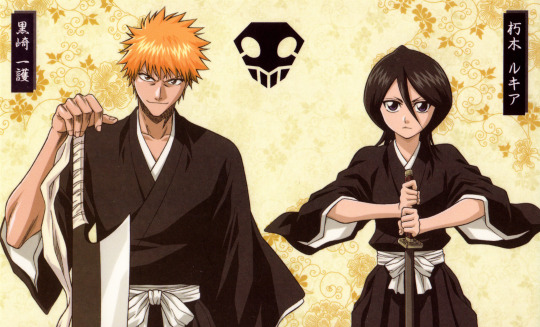
[My answers are under the cut because I rambled too much again sorry ❀]
-> Ichigo & Rukia's greatest strengths: ⦁ Their strong natural chemistry: They just have a genuine and instantaneous emotional connection that elicits a sense of familiarity and warmth. ⦁ Conversely, they fit into both the "birds of a feather" and "opposites attract" tropes. This implies that, despite their differences, they share a few commonalities—which is what accounts for their strong connection. ⦁ They have both positively impacted one another, consistently uplifting and motivating one another and bringing each other back from their lowest points. Most notably, Rukia is a source of strength, motivation, and light for Ichigo. In the same way that Ichigo is a driving force in Rukia's life, serving as a source of courage and resolve. ⦁ As a result of their similar experiences and struggles—especially with self-doubt and loss—they possess a unique understanding of one another that no one else possesses. Consequently, they are able to instinctively support one another in overcoming these challenges and progress towards bettering themselves.
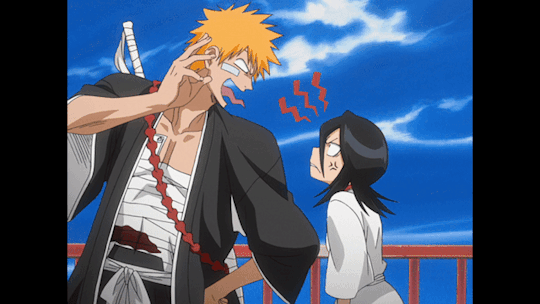
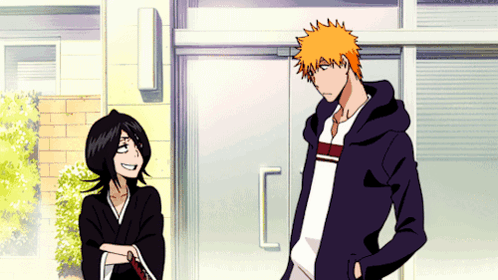
-> Ichigo & Rukia's greatest weaknesses: ⦁ The significant disparity in their lives, circumstances, and careers could stand in the way of their relationship—though with some concessions, this is not immutable. ⦁ They elicit each other's stubbornness and strong willedness, which often results in bickering. While I find this endearing, I know this is a source of contention for many fans. ⦁ Towards the end of the series—in particular during the TYBW arc—they don't get as much screentime together.
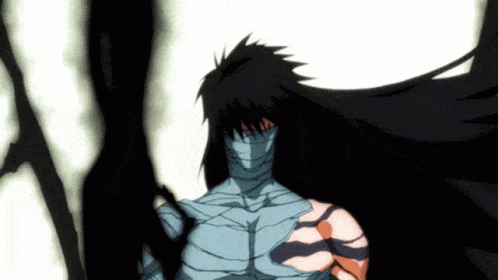
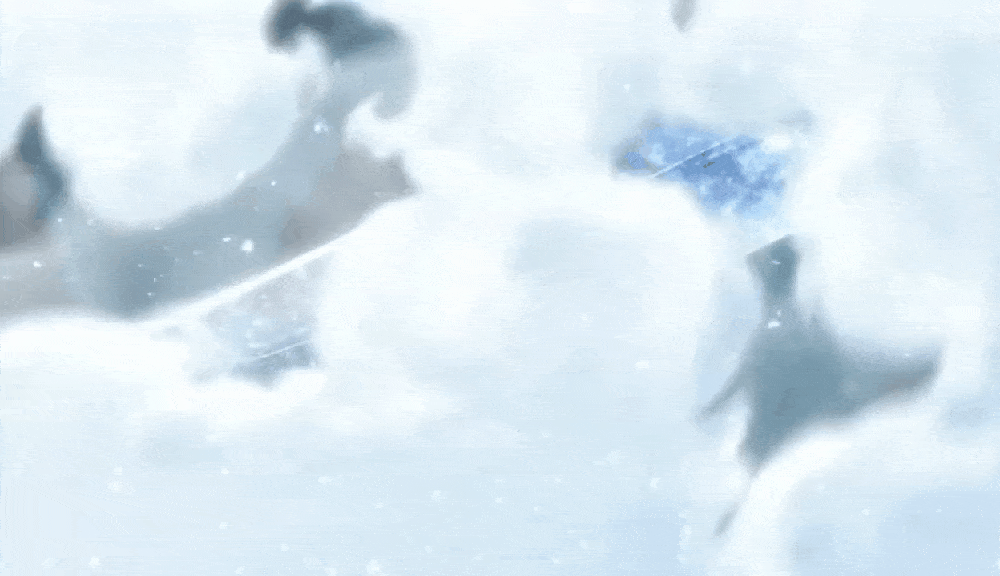
-> What I love about their dynamic: ⦁ Simply speaking, they are a perfect amalgamation of my favourite tropes and symbolism. ⦁ Their perfectly counterbalanced designs and symbolism seamlessly integrate into their respective roles in the series, not only enhancing their dynamic but also conveying the notion of being fated or destined soulmates. ⦁ Their mutually important roles in the series, along with their profound trust and respect for one another, foster a sense of equality and balance seldomly seen in shounen F/M pairings. ⦁ Throughout the series, their most significant moments are consistently paralleled and inverted. This not only enables both of them to mutually support and uplift one another but also further reinforces their dynamic as a cornerstone of the series.


-> My favourite canon IchiRuki moments: There are honestly so many, as I love all of the interactions, but if I had to limit myself to a top four, then it would be as follows:
4) When Rukia transfers her powers to Ichigo for the first time (Episode 1) - This has to be one of the most iconic IchiRuki scenes considering this is the moment where it all began.

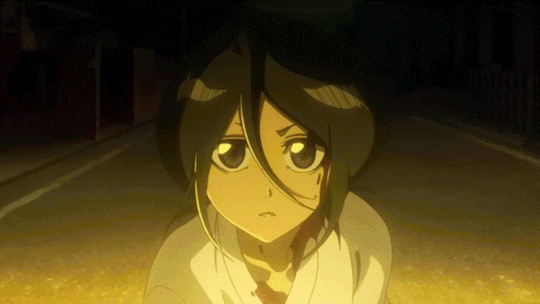
3) Ichigo saves Rukia from her execution - Another obvious choice. What makes this moment appealing to me is that Ichigo enables Rukia to finally be upfront about her feelings and reinvigorates her desire to exist. This allows this scene to transcend the typical hero saves the girl premise.
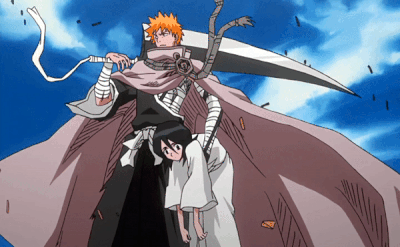
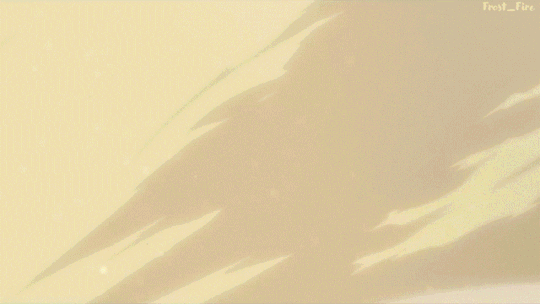
2) Rukia and Ichigo reuniting during the Fullbring arc - This scene brought me to tears with its masterful parallels of both of the previous entries on my list here by having Rukia show up to support and guide Ichigo once more. I adore the manner in which Rukia can uplift him and encourage him with only a few words and her presence.
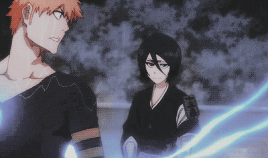

1) Ichigo thanking and saying farewell to Rukia after losing his powers - Some might find it ironic that this scene tops my list, but my reasoning goes beyond my fondness for angst. In my opinion, this scene—as well as its aftermath—cements how deeply Ichigo and Rukia care for one another. In the anime, the compelling voice acting as well as the soft colours and fluid animation deepen my love for this scene. Conversely, the manga's fluid panelling and delicate expressions are remiscent of that in shoujo manga.
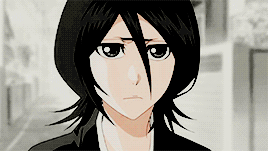

P.S. I would've highlighted some scenes from the 3rd Bleach Movie: Fade To Black—but since its still debated whether the movies are canonical, I opted not to.
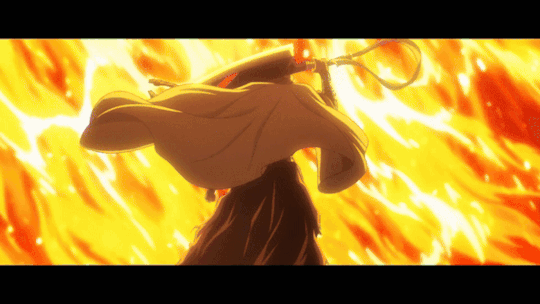
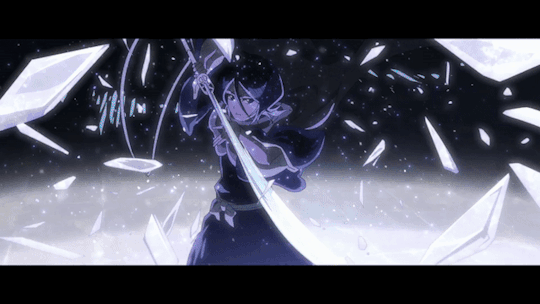
-> My favourite IchiRuki headcanons:
I'm more of a trope, motif, and symbolism analysis person—so I've never really given any thought to headcanons... To be honest, I don't think I fully know what counts as a headcanon. I love seeing people use Sun×Moon, Day×Night, Ying×Yang, and Fire×Ice symbolism for IchiRuki. Also, this is much less common, but I also like seeing fan artists use Forget-Me-Not flowers for IchiRuki—that's totally their flower. I don't know if those count as headcanons...So I'd love for you guys to share your favourite headcanons in the comments...

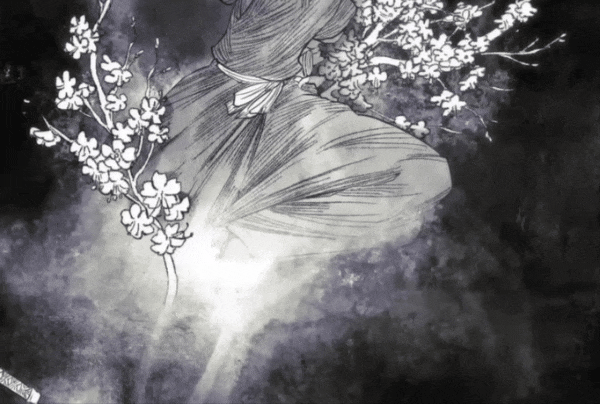
-> Ships that remind me about IchiRuki:
To be honest, this is a tricky question to answer... Everyone is drawn to ships for different reasons... Every ship is different, and every series is different... So it goes without saying that just because you ship a pairing in one series doesn't mean you'll ship a similar ship in another show. People always get offended when someone always gets offended when comparisons are drawn between ships—especially those from different series. Having said that, I tried my best; so, please don't criticise me too harshly I'd love to hear about any other ships that remind you guys of IchiRuki since I'm sure I might have missed a couple of good options...
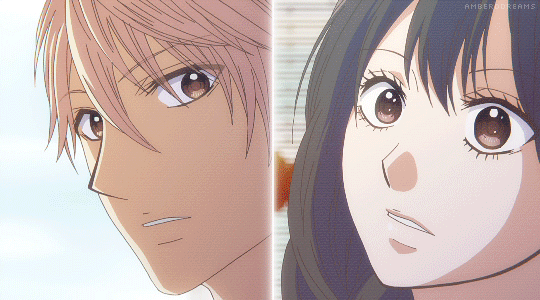

1) ChiKawa / Chika Kudo × Satowa Hozuki (Kono Oto Tomare!) — > Similar personalities/dynamics: ⦁ Just like Ichigo, Chika is a devoted and caring friend who can be a bit straightforward, impulsive, and short-tempered at times. ⦁ Just like Rukia, Satowa is graceful, determined, and stubborn. Satowa, like Rukia, has difficulty opening up to others and is adept at putting on a damsel in distress act to get her way in troublesome situations. ⦁ Both pairs initially get off on the wrong foot and often bicker because of their stubbornness, but ultimately come to respect, trust and care for one another. > Common tropes: ⦁ Both pairs share the "belligerent tension", "birds of a feather", "can't live with them, can't live without them", "everyone can see it", and "slow burn" tropes. > Similar backgrounds: ⦁ Before the start of the series, Chika often got into fights and had a "deliquent" image, which is somewhat reminiscent of Ichigo's backstory. ⦁ Satowa, like Rukia, is apart of a presigious family and faced immense pressure, which resulted in her becoming isolated and aloof. > Similar in appearance: ⦁ Both pairs have a guy with bright, light-coloured hair and brown eyes. Both pairs have a girl with straight, black hair with bangs.
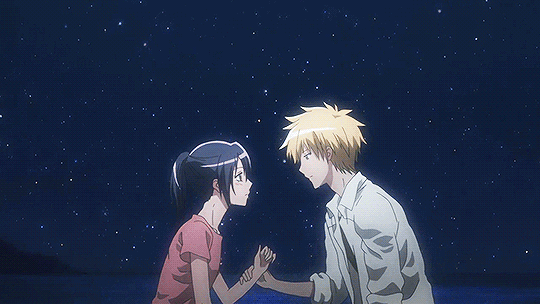
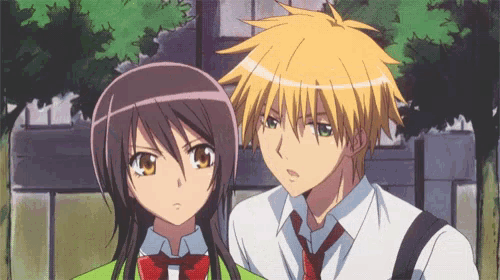
2) Takumi Usui × Misaki Ayuzawa (Kaichou wa Maid-sama!) — > Similar personalities/dynamics: ⦁ Usui, like Ichigo, is confident, reliable, talented, and protective. ⦁ Misaki, like Rukia, is intelligent, diligent, and determined. Both characters struggle with being honest with themselves (and others) about their feelings and wants. ⦁ Usui enjoys teasing Misaki, similarly to how Rukia oftentimes teases Ichigo. ⦁ Both pairs initially get off on the wrong foot and often bicker because of their stubbornness, but ultimately come to respect, trust, and care for one another. > Similar backgrounds: ⦁ Usui, like Rukia, is partially a member of a prestigious family and is now isolated and somewhat aloof as a result of his upbringing. ⦁ Misaki, like Ichigo, cares greatly for her family and younger sibling and works hard to protect her. > Common tropes: ⦁ Both pairs share the "belligerent tension", "birds of a feather", "can't live with them, can't live without them", "declaration of protection", "everyone can see it", "like an old married couple" and "slow burn" tropes. > Similar in appearance: ⦁ Both pairs have a guy with light and bright-coloured spikey hair. Both pairs have a girl with straight, black, shoulder-length hair with bangs.
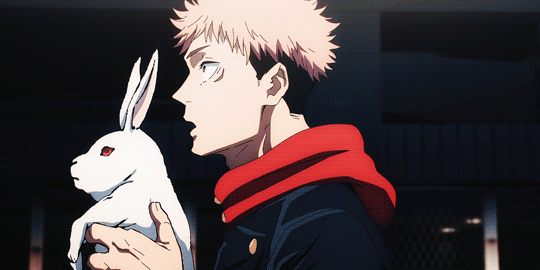

3) ItaFushi / Yuji Itadori × Megumi Fushiguro (Jujutsu Kaisen) — > Similar personalities/dynamics: ⦁ Both pairs have matching MBTI results. With Ichigo and Yuji falling under ISFP while Rukia and Megumi fall under ISTJ. ⦁ Yuji, like Ichigo, values protecting others—especially his friends—and is equally hard-working, determined, passionate, and impulsive. ⦁ Megumi, like Rukia, is intelligent, serious, blunt, diligent, and talented. He is equally as aloof, stubborn and short-tempered. ⦁ Both pairs have complementary personalities and fight well alongside their respective partner. Both pairs are very intuitive of their partner's needs and get along well—despite occasional teasing and bickering. > Similar Backgrounds: ⦁ Like Rukia, Megumi has a complex relationship with his older, adoptive sibling. Megumi and Rukia are both apart of prestigious clans that are involved with eliminating supernatural creatures. ⦁ Like Ichigo, Yuji has a mysterious family background with some of his family members being somewhat connected to one of the series' main villians. Both characters possess latent, inherent abilities as a result of their heritage. Both characters battle with literal "inner-demons". > Similar circumstances/roles in the series: ⦁ Both pairs consist of the protagonist and deuteragonist of their respective series. ⦁ Both Ichigo and Yuji were living relatively ordinary lives until they ran into their respective deuteragonist and had to awaken supernatural abilities to save themselves and the latter from a supernatural creature. ⦁ Both Rukia and Megumi have disobeyed orders/rules in order to protect their respective protagonist. ⦁ Both Ichigo and Yuji risked being executed as a result of the powers they awakened but were saved by their respective deuteragonist. ⦁ Conversely, at different points in their respective series, both Rukia and Megumi had lost their will to live and were then saved by their respective protagonist. > Common tropes: ⦁ Both pairs share the "battle couple", "can't live with them, can't live without them", "declaration of protection", "everyone can see it", "fan-preferred couple", "friends to lovers", "I owe you my life", "rescue romance", "star-crossed lovers", "slow burn", "sun × moon" and "you are better than you think you are" tropes.
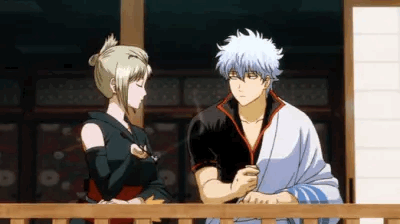
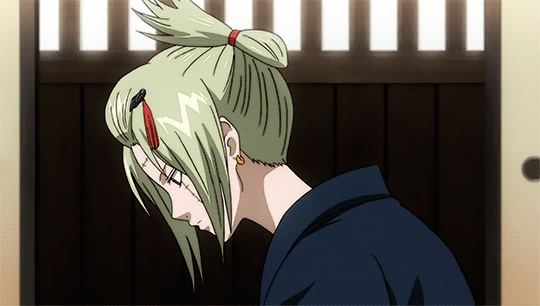
4) GinTsu / Gintoki Sakata × Tsukuyo (Gintama) — > Similar personalities/dynamics: ⦁ Gintoki, like Ichigo, is very strong-willed, stubborn, short-tempered and impulsive. Conversely, behind their cool and detached image, both characters are very charismatic, compassionate, reliable and empathetic. ⦁ In terms of MBTI results, Rukia and Tsukuyo both fall under ISTJ. Like Rukia, Tsukuyo initially believed in placing duty above her personal feelings and struggled with emotional transparency and self-worth. Both characters are very responsible, diligent, determined and blunt. ⦁ Both pairs have complementary personalities and fight well alongside their respective partner. Both pairs are very intuitive of their partner's needs and get along well. ⦁ Although both pairs often bicker and tease each other, this does not detract from their respect, trust, and care for one another. > Similar backgrounds: ⦁ Like Ichigo and Rukia, who comprehend and assist one another because of their similar past experiences, Gintoki and Tsukuyo have comparable understanding and support. This theme is further developed in Gintama's "Red Spider Arc" where Gintoki and Tsukuyo's backstories are even more explicitly contrasted. > Similar circumstances and roles in series: ⦁ Both Tsukuyo and Rukia have defied orders to protect their respective protagonist. ⦁ Both Tsukuyo and Rukia struggle with emotional transparency and self-worth. Both characters have learnt to embrace their feelings and be less constrained thanks to their respective protagonist. > Corresponding symbolism & motifs: ⦁ Both pairs have canonically been associated with celestial motifs with Rukia and Tsukuyo being associated with the moon while Ichigo and Gintoki are associated with the Sun. ⦁ Rukia and Gintoki have been respectively described as the "light" in Ichigo and Tsukuyo's lives. ⦁ Rukia has been associated with Winter and Night while Ichigo has been associated with Summer and Day. Conversely, Tsukuyo has been associated with night and autumn while Gintoki has been associated with day and spring. > Common tropes: ⦁ Both pairs share the "a shared suffering", "back-to-back badasses", "battle couple", "belligerent tension", "birds of a feather", "can't live with them, can't live without them", "declaration of protection", "everyone can see it", "flirting under fire", "friends to lovers", "I owe you my life", "mutual respect", "slow burn", "sun × moon" and "you are better than you think you are" tropes.

If you made it till the end, I'm so grateful. Thanks for reading my ramblings. Please let me know your thoughts in the comments below. Also, remember not to spread misinformation and to respect others' right to formulate their own opinions.
#frostfire-asks#myasks#ichiruki#ichigo x rukia#rukia x ichigo#bleach#bleach anime#bleach tybw#anime#anime ships#chikawa#chika x satowa#kudo x hozuki#kono oto tomare#usui x misaki#misaki x usui#misaki x takumi#takumi x misaki#kaichou wa maid sama#maid sama#jujutsu kaisen#itafushi#jjk#fushiita#itadori x fushiguro#fushiguro x itadori#megumi x yuuji#gintama#gintsu#gintoki x tsukuyo
46 notes
·
View notes
Text
I love it when two characters are so mutually obsessed with each other that you can't put them in the same room for any reason without the focus instantly pivoting from whatever you're actually trying to write about to a demonstration of such sheer disgusting romanticism that the reader's eyeballs start to melt out of their skull. Get yourself a ship that is less of a dynamic and more of an immutable character trait.
28 notes
·
View notes
Text
The express episodes have dropped so soon I will be put out of my misery and know exactly what the hell is going on with Ji Yong.
But before I dive in, jotting down these thoughts as of episode 29 to see if I'll be eating my words later.
SPOILERS, OBVIOUSLY:
His line about Song Mo one day understanding his true intentions (after expounding on what were supposedly his intentions in front of all of Prince Qing’s hidden troops just a moment earlier) makes it clear to me that there’s more to his actions than self-professed naked political ambition.
Plus, we know from episode 25 that he is probing into the Duke of Ding’s case and even leveraging his services as advisor and strategist to bargain for information from Prince Qing. There is little to no reason for him to care about this or put himself and his ambitions on the line, so why go to all the trouble?
One of my favorite aspects of this show is Ji Yong as foil to Dou Zhao, each representing a different attitude and approach to the problem of fate and will. I see why some may read Ji Yong as being in unrequited love but to me he reads more like DZ's platonic soulmate (even Granny, who introduced them with an eye for matchmaking, couldn’t see them as a couple!) After all, she is the only other person who is aware, as far as he knows, that they’re in Life 2.0, with the opportunity and burden of choosing differently.
Most importantly he doesn’t see himself in that light- in episode 26, he explicitly laments that friendship never takes precedence over romantic love. The feeling I got from his little monologue is not bitterness about the inability to “upgrade” to romantic love with Dou Zhao, but disappointment in his hope that Dou Zhao would value their special platonic love in the same way he does. As @therukurals reminded me- Ji Yong was pleased when Dou Zhao and Song Mo got together; it's only after Song Mo started going down the same path of Life 1.0 that he began to persuade DZ to leave her doomed husband to save herself.
He also keeps using the term 知己 (one who knows the self) to describe her, which is usually a word for friends of implicit mutual understanding, not romantic partners. But this pragmatist who doesn’t believe he can change much of anything also doesn't hesitate to throw his small stones into the river behind the scenes, perhaps hoping that the tiny ripples that result might alter Dou Zhao’s trajectory just a little before they are subsumed by the river of fate's overwhelming current, to shift her ending away from tragedy again. (Remembering his at-all-costs approach to pushing Dou Ming and Wei Tingyu together...)
I think he believes in the unforgiving immutable larger framework of fate, where the set and story remain but the players can change, whereas Dou Zhao hopes to rewrite the story altogether. In this light, it makes sense that he throws his lot in with Prince Qing once again in Life 2.0 even knowing the ending for himself if he does. He thinks he's found the key- when fate doesn't concern itself with intentions, only actions and consequences, then the greatest advantage is being in a position to place the players and direct the action.
Side note: I find his nickname for her super interesting (which unfortunately isn't translated in the subs) but haven't yet formulated coherent thoughts about it. He calls her Zhuang Zhou aka Zhuangzi aka the philosopher who dreamed he was a butterfly and wondered if in fact, it was a butterfly dreaming it was the philosopher.
42 notes
·
View notes
Text
A train of thought I've had in my latest playthrough of Half-Life, Black Mesa, and the Half-Life 2 series:
Okay, so. Headcrabs, right? The little guys who leap onto you and try to eat your face so they can turn you into a zombie.
There were many instances ingame of headcrabs leaping at me, missing completely, and sailing off a cliff, or falling into water and drowning, or various other things. They also ran into other dangers, too, like fire, or electricity. Just absolutely no thoughts head empty, even when they lemminged after each other to their doom. They didn't even react to pain aside from screeching about it, they just trundled along into my gunshots!
And so I thought to myself with an overthinking chuckle: you'd think that creatures which evolved in Xen, a dimension which consists mostly of tiny rock islands suspended in an endless void, would have evolved some sort of "look before you leap" instinct. Like that's how natural selection works. You can get me to suspend disbelief about alien physics, but "creatures who naturally exhibit a behavior which is likely to get them killed are less likely to live long enough to produce offspring than members of the same species who do not exhibit that deadly behavior" is immutable logic! Maybe their reproduction cycle simply produces enough headcrabs per parent that there isn't enough selection-pressure to get them to change, like with sunfish? I dunno, this isn't an actual criticism, I'm just doing a silly overthink of a gameplay thing which is neither trivial nor necessary to change.
But then I wandered into a spot in Water Hazard which had clearly been hit with headcrab-shells, and I thought: wait a minute. Headcrabs are used as bioweapons by both the Nihilanth and the Combine! Maybe headcrabs were less-successful at being weapons if they were actually careful about attacking their targets, so they were altered to just make them completely reckless and to ignore all pain and all that. The poison headcrabs do react to getting shot, presumably because the Combine considers them to be particularly valuable or something. And that's not mutually exclusive with the lots-of-reproduction thing, either -- Ravenholm is jam-packed with zombies but there's only a handful of actual headcrab-shells lying around. Maybe Gordon's HEV suit makes it easier for him to dodge them, too, and headcrabs are much less likely to miss when going after other targets! Yeah, this random gameplay weirdness which it wouldn't have been worth changing totally makes sense!
#shenanigans#half-life#half life#half-life 1#half life 1#half-life 2#half life 2#headcrab#overthinking#let's ruin video games
29 notes
·
View notes